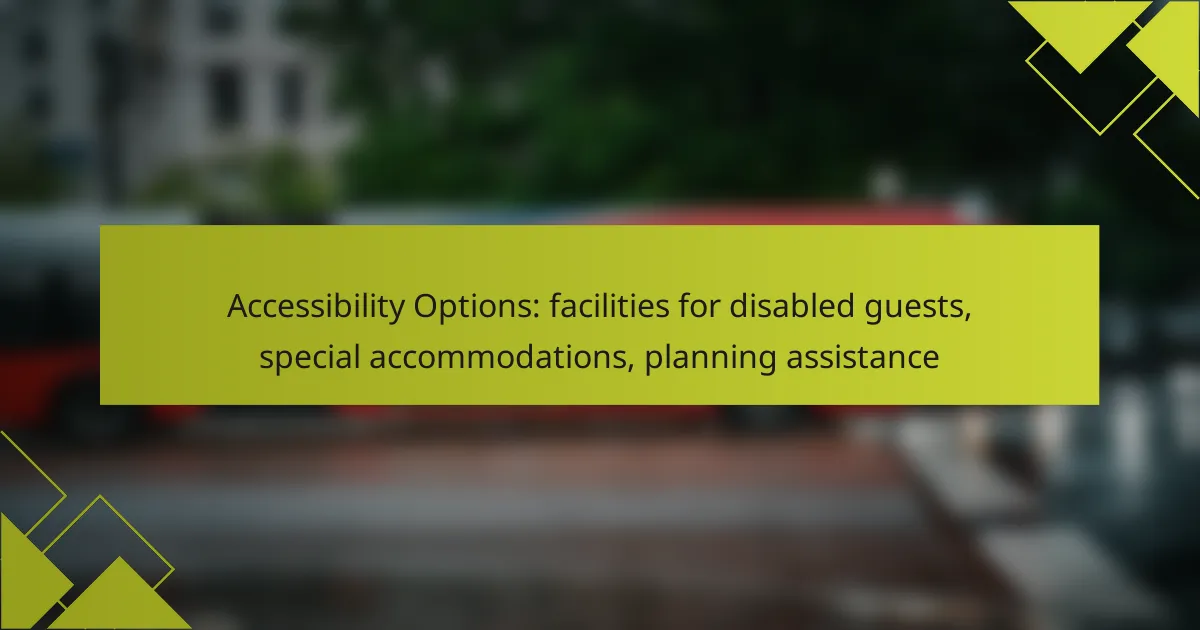Accessibility options for disabled guests are essential for ensuring a comfortable and enjoyable experience. These options include various facilities and accommodations, as well as planning assistance tailored to meet individual needs. From specialized booking platforms to personalized itineraries, there are numerous resources available to help travelers navigate their accessibility requirements effectively.

What accessibility options are available for disabled guests?
Accessibility options for disabled guests include various facilities and accommodations designed to ensure comfort and ease of access. These options typically encompass physical modifications, service policies, and assistance services tailored to meet diverse needs.
Wheelchair ramps
Wheelchair ramps are essential for providing access to buildings and facilities for guests with mobility impairments. Ramps should have a gentle slope, ideally not exceeding a 1:12 ratio, to ensure safety and usability. Regular maintenance is crucial to keep ramps clear of obstructions and in good condition.
When planning an event or visit, check the availability of ramps at entrances, exits, and key areas within the venue. Ensure that ramps are wide enough to accommodate various wheelchair sizes and types.
Accessible restrooms
Accessible restrooms are designed to accommodate individuals with disabilities, featuring wider stalls, grab bars, and lower sinks. These facilities should comply with local regulations, such as the Americans with Disabilities Act (ADA) in the United States, which outlines specific requirements for accessibility.
When assessing accessible restrooms, consider the location and number of facilities available in relation to the venue. It’s helpful to have clear signage directing guests to these restrooms, ensuring they can find them easily.
Service animal policies
Service animal policies allow individuals with disabilities to bring their trained service animals into public spaces. Typically, only dogs are recognized as service animals under the ADA, although some states may have broader definitions that include other animals.
It’s important to verify the specific service animal policies of a venue before visiting. Ensure that staff are trained to recognize and accommodate service animals appropriately, allowing them to accompany their handlers at all times.
Accessible parking
Accessible parking spaces are designated areas that provide convenient access for disabled guests. These spaces should be located near building entrances and be wider than standard parking spots to accommodate wheelchair users.
Check the number of accessible parking spaces available at the venue and whether they require a specific permit or pass. It’s advisable to arrive early to secure a spot, especially during busy events.
Visual and auditory aids
Visual and auditory aids enhance the experience for guests with sensory impairments. These aids may include large print materials, Braille signage, and assistive listening devices available upon request.
When planning an event, consider providing materials in multiple formats to cater to various needs. Ensure that staff are trained to assist guests in utilizing these aids effectively, creating an inclusive environment for all attendees.

How can I find accommodations for disabled guests?
Finding accommodations for disabled guests involves utilizing various resources that cater to accessibility needs. Options include online booking platforms, specialized travel agencies, and hotel websites that offer filters for accessibility features.
Online booking platforms
Online booking platforms like Booking.com and Expedia often have sections dedicated to accessibility features. You can filter search results to show only properties that meet specific needs, such as wheelchair access or hearing-impaired facilities.
When using these platforms, read reviews from other disabled travelers to gauge the actual accessibility of the accommodations. Pay attention to details like room layout and available amenities, as these can significantly impact your stay.
Travel agencies specializing in accessibility
Travel agencies that focus on accessibility can provide personalized assistance in finding suitable accommodations. These agencies often have in-depth knowledge of hotels and services that cater specifically to disabled guests.
Consider reaching out to agencies that are certified in accessible travel, as they can offer tailored advice and may have partnerships with hotels that prioritize accessibility. This can save time and ensure a smoother travel experience.
Hotel websites with accessibility filters
Many hotel chains now feature accessibility filters on their websites, allowing you to easily identify properties that meet your requirements. Look for options that specify accessible rooms, parking, and facilities.
Before booking, contact the hotel directly to confirm the availability of the requested accommodations. This ensures that the features listed online are accurate and meet your specific needs, preventing any surprises upon arrival.

What planning assistance is offered for disabled travelers?
Planning assistance for disabled travelers includes tailored services designed to enhance accessibility and comfort during their trips. This support often encompasses personalized itineraries, detailed accessibility guides, and connections to local support services.
Personalized travel itineraries
Personalized travel itineraries are customized plans that take into account the specific needs of disabled travelers. These itineraries can include accessible transportation options, wheelchair-friendly accommodations, and activities that cater to various mobility levels.
When creating a personalized itinerary, consider factors such as the proximity of attractions to public transport and the availability of accessible facilities. Engaging a travel agent who specializes in accessible travel can help streamline this process.
Accessibility guides for destinations
Accessibility guides provide crucial information about the level of accessibility at various destinations, including hotels, restaurants, and attractions. These guides often include details on wheelchair access, restroom facilities, and available services for disabled guests.
Travelers can find accessibility guides online or through local tourism boards. It’s beneficial to check for recent updates, as accessibility features can change frequently, impacting the travel experience.
Local support services
Local support services can significantly enhance the travel experience for disabled guests. These services may include assistance with transportation, personal care, and navigating local attractions.
Before traveling, research local organizations that offer support services tailored to disabled individuals. This can include arranging for a personal assistant or finding services that provide mobility aids. Always confirm the availability and reliability of these services in advance to avoid inconveniences during the trip.

What are the criteria for selecting accessible accommodations?
When selecting accessible accommodations, consider factors such as location, specialized services, and guest feedback on accessibility. These criteria ensure that the needs of disabled guests are met effectively, enhancing their overall experience.
Location proximity to attractions
Choosing accommodations close to attractions is crucial for disabled guests. Proximity reduces travel time and physical strain, making it easier to enjoy nearby sites. Look for hotels or rentals within a short walking distance or those that offer accessible transportation options.
Consider areas with accessible public transport links, as this can significantly enhance mobility. For instance, accommodations near bus or tram stops with low-floor vehicles can provide greater ease of access.
Availability of specialized services
Specialized services, such as wheelchair rentals, mobility assistance, or personal care services, can greatly enhance the stay for disabled guests. Check if the accommodation offers these services or can arrange them through local providers.
Additionally, inquire about the availability of accessible features like grab bars, roll-in showers, and visual or auditory aids. These amenities can make a significant difference in comfort and safety during the stay.
Guest reviews on accessibility
Reading guest reviews focused on accessibility can provide valuable insights into the actual experiences of disabled travelers. Look for comments on the effectiveness of accessibility features, the responsiveness of staff, and the overall comfort level.
Pay attention to reviews that detail specific accommodations, such as the ease of navigating the property and the quality of specialized services. This feedback can help identify potential pitfalls and ensure a more informed decision.

How do different regions cater to accessibility needs?
Regions around the world implement various regulations and standards to ensure accessibility for disabled guests. These measures often include physical accommodations, service provisions, and planning assistance tailored to meet local needs.
Accessibility regulations in the UK
The UK has established comprehensive accessibility regulations under the Equality Act 2010, which mandates that public services and facilities must be accessible to individuals with disabilities. This includes requirements for ramps, accessible restrooms, and clear signage.
Local authorities often conduct audits to ensure compliance, and businesses may receive guidance on how to improve their facilities. It is advisable for establishments to engage with disabled guests to understand their specific needs and preferences.
ADA compliance in the USA
The Americans with Disabilities Act (ADA) sets forth standards to ensure accessibility in public spaces across the USA. This includes requirements for wheelchair ramps, accessible parking, and service animal policies, which are crucial for accommodating disabled guests.
Businesses are encouraged to conduct regular accessibility assessments and provide training for staff on how to assist guests with disabilities. Failure to comply with ADA standards can result in legal consequences, making adherence essential for all public-facing entities.
European accessibility standards
European countries follow various accessibility standards, often guided by the European Accessibility Act, which aims to improve access to products and services for disabled individuals. This includes requirements for public transport, buildings, and digital services.
Each member state may have its own specific regulations, but common elements include the need for accessible entrances, elevators, and information in multiple formats. Businesses should familiarize themselves with local laws to ensure they meet the necessary standards and provide a welcoming environment for all guests.



